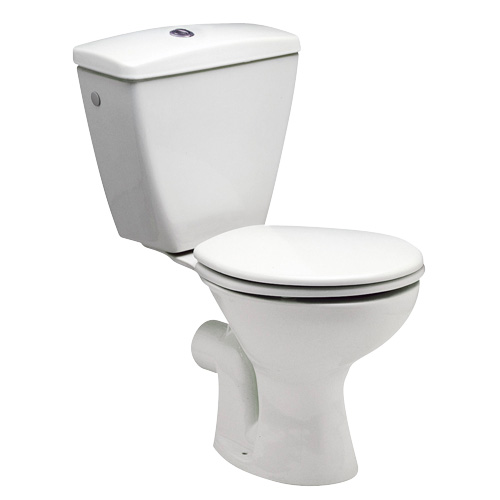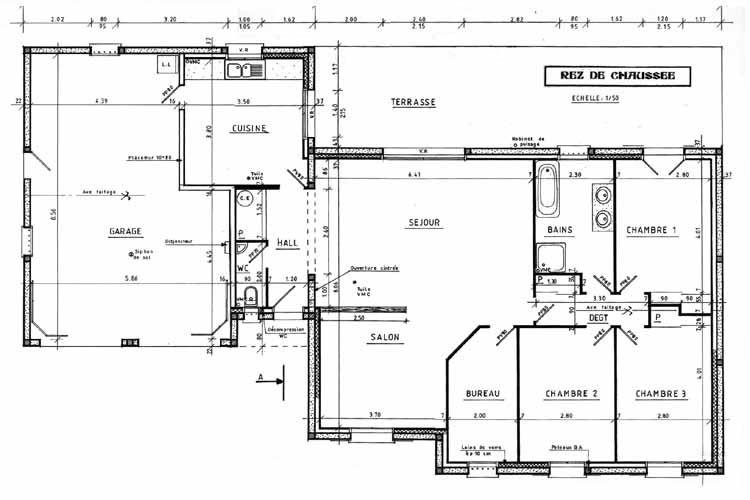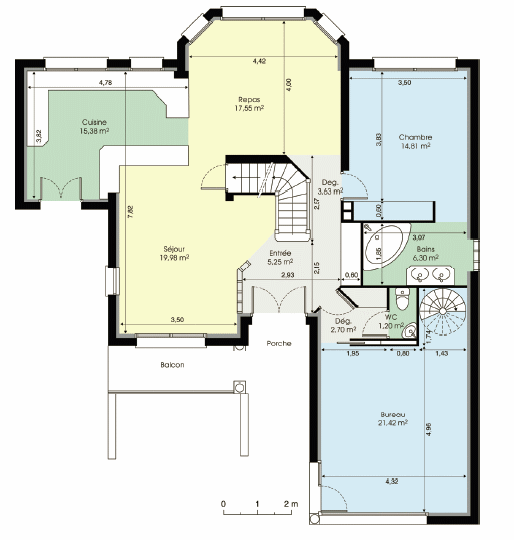LESSON
Les toilettes en France
Bob
Ponterio
SUNY Cortland

from Leroy Merlin catalog |
Où sont les toilettes, s'il vous plaît?
Many French teachers can remember stories of being confused between "la salle de bains" and "les toilettes" on their first trip to France. One teacher I know was in a café and asked the waiter:
- La salle de bains, s'il vous plaît?
- Pourquoi madame? Vous désirez prendre un bain?
Another friend asked the same question in someone's home upon his first arrival in France. Once in the "salle de bains", he looked around for the toilet but not finding one, simply proceeded to wash his hands and come back to the table with a confused and rather desperate look on his face.
|
Why is there a much stronger distinction made in France, and why is it that the toilet and bathroom are separated there? Is it just an accident of history or is there a deeper perspective at work? Moving the toilet from the outhouse into the home is fairly recent on French farm houses where this often occurred around the 1950's or early 60's. In town, the addition of toilets in older buildings where space was at a premium may have been more complicated than in American buildings with larger bathrooms. But the choice to separate goes deeper. A look at vacation rental apartment ads will show that separate "salle de bains" and "W.C." are often listed as a selling point, so putting them together is viewed as a serious disadvantage.
Floor plan:

garnoul.free.fr/Maison/Plan_Maison.htm
Question: Looking at this floor plan, find the W.C. and "la salle de bains". Where are they in relation to each other?
In this floor plan of a typical French home, we see that the W.C. is not only separate from the bathroom, it is on the opposite side of the house. We also see that there are two doors between the W.C. and "la cuisine". Indeed, French building codes require this separation. |
The location of French toilets is tied to a number of cultural issues, especially public vs. private space and concepts of clean vs. dirty.
The entry way in a French home often illustrates the separation of public and private space. This area is a buffer between the outside and the interior of the home, so the doorway usually does not open directly into the living area. In addition, many of the doors that typically remain open in American homes are generally closed in France. This is most strongly the case of the bathroom and W.C. whose doors are always closed. The space related to certain bodily functions is private, even when no one is in there.
 |
Question: In this floor plan of the Rez de Chaussée of a French home, what separates the entrance from the living area? How many doors separate the W.C. from the kitchen? Is it likely that guests would ever see the "salle de bains" in this house? |
|
There is a wall separating the "entrée" from the "séjour" and a staircase separating it from the dining area.
The W.C. is separated from the rest of the house by two doors maintaining separation from the kitchen even though the latter is open. An additional pocket door adds privacy between the W.C. and the "bureau".
The "salle de bains" is located within a "chambre", so a guest would never see it. There is a "lavabo" in the W.C. for washing hands. |
Task: Make a listof five words that you miight
associate with "taking a bath." Make a second list of words that you
associate with "toilet"? Are they the same or different words? How
are they different?
The "salle de bains"is related to personal hygiene
("l'hygiène corporelle"), a word that is more strongly associated
with health in France ("l'hygiène alimentaire"). "Les
W.C.", on the other hand, are thought of as dirty.
An old joke goes that a northerner visiting Cajun Louisiana
expressed some concern that the outhouse might be too close to the house he
was staying in. One of the people he was staying with reassured him, saying
that he had heard that in the cities up north, they even had the toilet right
inside the house!
Vocabulary
Les W.C. ("water closet"), les toilettes, les cabinets (de toilette), les vécés, et en argot, les chiottes. One might even call it "le nécessaire" or "le petit coin". A toilet bowl is "la cuvette".
In Belgium, the word is singular, "la toilette",
and a common Belgian joke about the French is that the word is plural
in France because you have to try several in order to find one that
is clean.
Don't forget to "tirer la chasse d'eau"!
|
http://www.construiresamaison.com/plan/plan-maison.asp
http://www.construiresamaison.com/plan/plan-maison.asp


